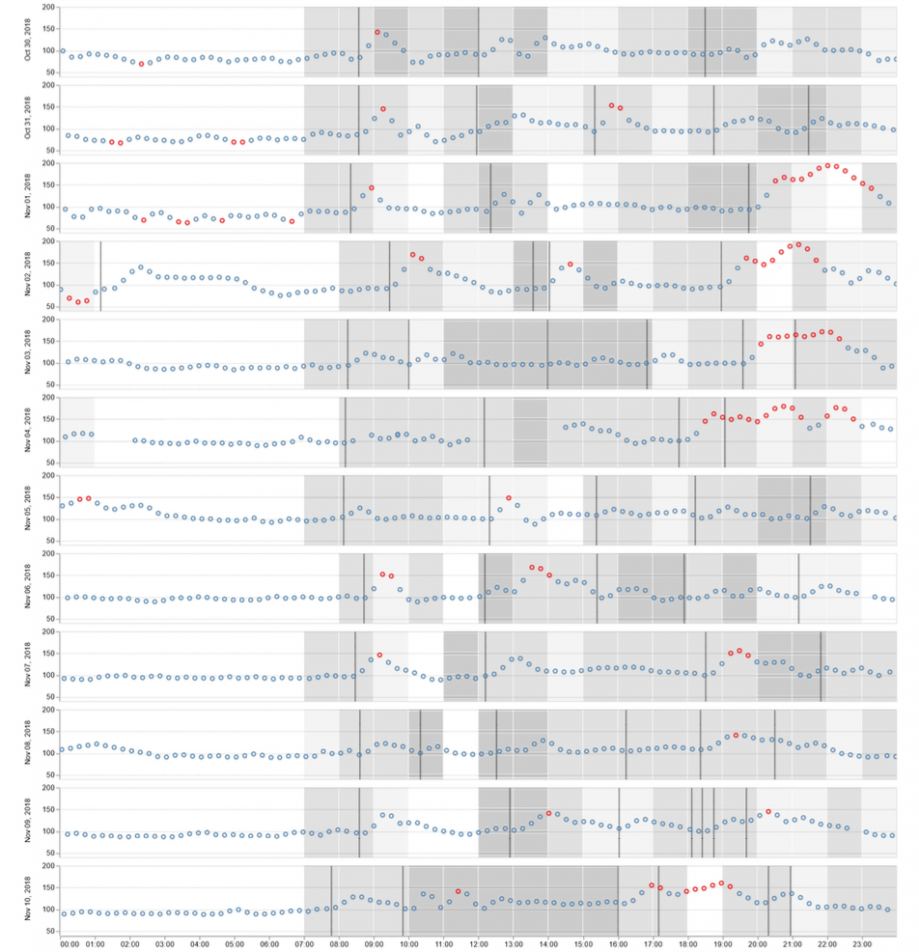
BLOG
QS Guide: Testing Food with Blood Glucose
Steven Jonas
September 19, 2019
Not all foods affect your metablism the same way.

Not all foods affect your metablism the same way.
What We Are Reading Newsletter from Mar 21, 2015
What We Are Reading Newsletter from Feb 21, 2015
Julie Price has been tracking her weight consistently for the last four years. Like many of us, she found that her weight goes up and down depending on various life events. In this talk, presented at the Bay Area QS meetup group, Julie discussed what she’s learned about her weight and what correlates with weight…
Bryan Ausinheiler was experiencing gastrointestinal issues for years and decided it was time to figure out what was causing it. By precisely controlling his diet – eating exactly the same quantities at exactly the same time – for a month and then measuring the quality of his stool in a self-designed spreadsheet he was able…
Sue Lueder contracted mysterious ongoing stomach ailment after a vacation to Spain that her physician dismissed as heartburn. To find the true root of the cause, she began to track her symptoms and diet. In this talk, presented at our 2013 Global Conference, Sue describes how she used the data to make sense her illness.
At the start of 2013 Ellis Bartholomeus decided to start keep track of her life. Since her friends were always asking about her eating habits (she was a consistent traveler and rarely at home) she decide to start tracking her food. Instead of entering in her food into a calorie counting app she started taking…
Four years ago Morris Villarroel was inspired to start writing things down. He started with a simple Muji notebook and begun adding some structure such as daily logs, life events, and review of books and articles he had read. In the process of filling out over 130 journals his process has evolved to include journaling…
Rosane Oliveiria is a researcher and scholar that focuses on integrative medicine, genomics, and nutrition. She’s also an identical twin. In 2012 she was struck by the different patterns of weight fluctuations that she and her sister, Renata, had been experiencing. Using historical data and medical records she was able to go back in time…
Food. It’s a wonderful social glue that binds people and cultures together in common practices of preparation, presentation, and consumption. It also happens to be a behavior perfectly positioned for self-tracking. Have I ate too much? Did I get enough vitamins? Am I drinking enough water? Am I drinking too much beer? These introspections can…
We’ve posted some great talks by Amelia Greenhall here on the blog and we’re excited to bring you another insightful presentation. Last year Amelia gave a wonderful talk about her weight loss journey and the power of using running averages. In this updated talk Amelia gives a more in-depth look about how using a 10-day moving…
Hugo Campos lives with arrhythmia, and is a self-professed data nudist. He decided to do an experiment last December to improve his health and his heart – going vegan and taking beautiful pictures of every single meal he ate to post to a public Flickr set. In the video below, Hugo gives an animated talk about…
Denisa Kera is a professor, philosopher and designer interested in DNA and food data. She asks, what happens when people share data in social situations? She organizes DNA Dinners at a local hackerspace to experiment with this question. In the video below, Denisa talks about how she turned her genetic data into a bruschetta dish,…
Randy Sargent has an hypothesis that eating certain foods, like tomatoes, makes him irritable and anxious. He asked himself, “How can I structure an experiment on myself so that I don’t know whether I’m eating tomatoes or not?” and “How would I go about quantifying my irritability?” In the video below, he explores ways to…
Rob Portil is sixty-six years old and has been overweight twice in his life. He’s been using FitBit for the past four months, and has reached his target weight. In the video below, he describes how he experiences the daily tracking, how his sweetheart experiences it differently, which Four Hour Body workouts he does, and…
In the last session of the day, we had a few experimental talks on noticing how food changes physical condition. It was also an interesting series of talks that shows the importance of collecting our own subjective data to back up or refute the other technological data that we might also have access to. I…
Robin Barooah gives an insightful talk below on embodied learning. He used a binary self-tracking system, without keeping any of the data, to train his body to know what foods made him feel energized or lethargic. This awareness helped him to lose 45 pounds over the course of several months, but more importantly, it serves…
Cedric Yau trains in kung fu 12 hours a week. He wanted to track his his activity and energy levels, so he created a text-messaging service called Well+Tuner, where he also records notes for how he feels on different days. He learned how to time his food intake and 50 daily supplements for maximum energy,…
Sam, age 9, is the son of my Wired colleague Fred Vogelstein and his wife Evelyn Nussenbaum. Last year, Fred published a remarkable story in the New York Times magazine, Epilepsy’s Big Fat Miracle, about how he and Evelyn treat Sam’s epilepsy with a high fat and nearly zero carbohydrate diet. In an average week,…
Given that the United States eats more average daily calories per person than any other country, it’s probably a good idea for us to track what we eat a little more closely. QS Amsterdam folks can sit this one out if you like! This week’s roundup is for food tracking tools. It’s part of our…